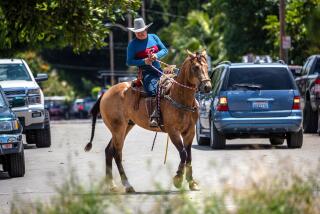Experience, ‘Horse Sense’ Are Key to Success in the Equestrian Arena
- Share via
The equestrian world can be confusing to the uninitiated, and there are many pitfalls for the unwary. Success in owning, riding or showing has much to do with experience and an understanding of the animals. The following is a sampling of commonly asked questions about horses and riding, along with some general guidelines--and a dose of “horse sense”--to help demystify the stable scene for equine enthusiasts.
Q Which breed makes the best show horse?
A There are no hard-and-fast rules; it depends on which type of competition you plan to enter and how much you can afford to spend. For dressage classes, the fluid, ground-covering stride of warmblood breeds such as Hanoverians and Trakehners often catches the judge’s eye. Thoroughbreds or warmblood crosses (such as Anglo-Trakehners) tend to excel in jumping events, which require a muscled animal with stamina and strong hindquarters.
And despite the breed--or the price you paid for the animal--nothing is a substitute for temperament and training. Some successful horses on the national and international competition circuit have been unusual breeds or cross-breeds--including a mule that won the preliminary division of the prestigious Ledyard Farms Horse Trials on the East Coast in recent years.
Q My horse has started to pin his ears when I open his stall door and gnashes his teeth when I tighten the girth. Why is he doing this and what how can I stop this bad behavior?
A Don’t be too quick to blame your horse; there may be factors outside his control. If your horse is boarded in someone else’s stable, check to see whether the person who does the feeding and mucking is treating your horse too roughly. Horses sometimes react this way when they are shoved around by insensitive handlers.
Another possibility is that you are working your horse too hard and he resents the riding sessions. If your horse is in intensive training, try hacking him regularly--maybe even bareback--outside the arena or at a public park with bridle paths. Horses, just like riders, sometimes need a break in routine.
If the behavior persists, consult your veterinarian or farrier. The horse may have a physical problem, such as sore feet, girth sores or teeth that need floating. Horses can’t tell us when they’re in pain, so sometimes they use bad behavior as a call for help. Learn to “listen” to your horse.
Q I keep my horse at home and don’t have an arena to practice in. How can I prepare for shows and improve my chances of winning?
A If you can afford to transport the horse into a facility with an arena and pay for hourly ring use, that is an option. If not, don’t fret. The name of the show game is practice and precision, wherever you ride.
Bruce Davidson, twice world champion in three-day eventing, says he has even practiced dressage in an open field. “If you don’t have an arena, use natural markers--a tree, a big rock, whatever is out there,” he says. “Start trotting at one marker and plan to make the downward transition to walk at the next marker. It’s the same principle as riding from letter-to-letter in the arena.”
Q How should I choose a riding instructor and a trainer for my horse?
A That is largely a personal--and sometimes financial--decision. Top trainers are expensive, but many riders are willing to pay the price to get the desired results. Some riders choose instructors based on reputation, show results, or friends’ recommendations.
Sometimes you have to try a few instructors before you find one you click with. Teaching styles vary widely, from quiet, encouraging methods to high-pressure tactics. What motivates one rider may make another nervous and unable to concentrate. Therefore, it is a good idea to ask the instructor whether you can watch him or her teach a lesson or two before you sign up.
When you find a compatible instructor, you also have to ensure that your horse is comfortable with that person’s methods. Horses have personalities too. Some take well to certain training techniques; some prefer male or female trainers. If your horse is not progressing and is patently unhappy in lessons, you may want to try another trainer.
But try to avoid instructor hopping. It is generally not a good idea to change instructors frequently or to combine various methodologies, as it will only confuse the horse (and probably the rider as well). Once you find an instructor you and your horse feel comfortable with, stick with him or her long enough to make some progress.
Readers may send horse-related news or questions to her at: Orange County Life, The Times, 1375 Sunflower Ave., Costa Mesa 92626.
More to Read
Sign up for Essential California
The most important California stories and recommendations in your inbox every morning.
You may occasionally receive promotional content from the Los Angeles Times.













